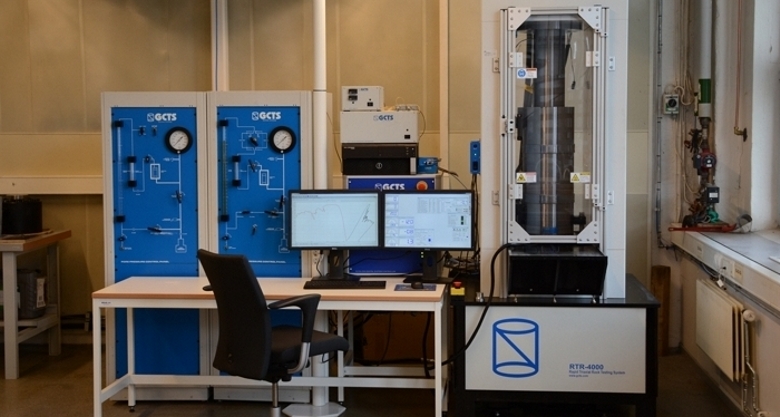Rock Mechanics Laboratory - IGP
Rock Mechanics Laboratory

Knowledge about the mechanical properties of rocks is crucial for all construction work in rock mass. The rock mechanics laboratory performs a number of standardized tests, as well as special assignments. Since 1964, the laboratory has performed in situ rock stress measurement. This activity is currently managed by SINTEF Building and Infrastructure.
Rock mechanical tests:
- Uniaxial and triaxial compressive strength
- Strain measurements for determining Young’s modulus and Poisson’s ratio
- Pore pressure (triaxial test)
- Sonic velocity: P- and S-waves
- Point load test
- Tensile strength test: Indirect (Brazilian test) and direct tensile strength, fracture toughness
- Tilt test (basic friction angle)
Equipment/facilities:
- GCTS RTR-4000 Rock mechanics system
- Max. axial load: 4000 kN
- Max. confining pressure: 140 MPa
- Max. pore pressure: 140 MPa
- Acoustic emission (8 channels)
- Temperature control up to 200˚C
- Dimensions cylindrical core specimen: diameter 35-100 mm; length < 250 mm
- Servo controlled
- Losenhausen hydraulic press
- Max. axial load: 100 kN
- GCTS point load tester (field equipment)
- Max. axial load: 100 kN
- Preparation equipment
- Core drilling machine
- Cutting machines
- Surface-grinding machine
Laboratories at IGP
- Chemical/Mineralogical Laboratory
- Petrographic- and Ore Microscopy Laboratory
- Electron microscopy (EM) Laboratory
- Mineral processing Laboratory
- Thin Section Laboratory
- Geological Engineering Laboratory
- Rock Mechanics Laboratory
- Rock Magnetic Laboratory
- Hall laboratory
- Reservoar Laboratory
- Schlumberger geolab
Workshops:
